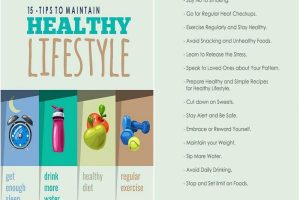Discover the Secrets to Maintaining a Healthy Lifestyle

Importance of a Healthy Lifestyle
In today’s fast-paced world, the importance of embracing a healthy lifestyle cannot be overstated. Choosing to prioritize health is not merely about physical appearance; it influences every aspect of life, from energy levels and mental clarity to long-term health and longevity. Consider this: simple changes in daily habits can lead to profound benefits. For instance, Sarah, a busy professional, found herself drained by the end of the workday. By incorporating nutritious meals and a regular exercise routine into her schedule, she regained her vigor and improved her productivity. Here’s how a healthy lifestyle can positively impact your life:
- Discover the Secrets to Maintaining a Healthy Lifestyle
- Importance of a Healthy Lifestyle
- Nutrition and Diet
- Balanced Diet
- Importance of Hydration
- Exercise and Fitness
- Importance of Regular Exercise
- Different Types of Physical Activities
- Mental Health and Well-being
- Stress Management
- Importance of Sleep
- Health Screenings and Check-ups
- Preventive Measures
- Regular Doctor Visits
- Building Healthy Habits
- Establishing a Routine
- Setting Realistic Goals
- Enhanced Energy Levels: Proper nutrition, combined with regular exercise, can drastically boost energy throughout the day.
- Improved Mental Health: Engaging in physical activity releases endorphins, often referred to as “feel-good” hormones, which can help manage stress and anxiety.
- Better Sleep Quality: A balanced diet and regular exercise contribute to a more restful night’s sleep, which is essential for overall well-being.
- Long-term Health Benefits: Maintaining a healthy lifestyle can reduce the risk of chronic diseases such as heart disease, diabetes, and certain cancers.
To sum up, adopting a healthy lifestyle is an investment in one’s future. By embracing mindful eating, regular exercise, and mental wellness strategies, individuals can significantly enhance their quality of life and well-being. The journey toward health starts with small, manageable changes that lead to lasting habits. Each step taken towards this goal is a step towards greater fulfillment and happiness.
Nutrition and Diet
Balanced Diet
Transitioning to nutrition, a balanced diet plays a crucial role in maintaining overall health and well-being. A balanced diet includes a variety of foods from all food groups, ensuring that the body receives the necessary nutrients it needs to function optimally. For instance, John, a parent of three, found that when he planned family meals to include a colorful array of fruits, vegetables, whole grains, and healthy proteins, not only did everyone feel more energetic, but they also enjoyed discovering new recipes together. A balanced diet can be summarized as follows:
- Fruits and Vegetables: Aim for at least five servings a day.
- Whole Grains: Include options like brown rice, oatmeal, or whole grain bread.
- Proteins: Choose lean meats, fish, beans, and legumes.
- Dairy: Opt for low-fat or fat-free options to keep calcium intake high without excess saturated fats.
- Fats: Focus on healthy fats found in nuts, seeds, avocados, and olive oil.
Importance of Hydration
Equally important as a balanced diet is hydration. Water is vital for almost every function in the body. From regulating body temperature to aiding digestion and supporting cellular functions, staying hydrated has a profound impact on health. Many may overlook hydration—after all, who hasn’t been caught up in work and forgotten to drink water? Jenna, a teacher, realized her constant fatigue could be linked to her low water intake. Since she began carrying a reusable water bottle, she’s noticed remarkable changes in her energy levels and concentration. Incorporating hydration into daily life can be simple:
- Aim for at least eight 8-ounce glasses of water a day.
- Include hydrating foods like cucumbers, watermelon, and oranges.
- Set reminders on your phone to drink water regularly.
In conclusion, a balanced diet paired with adequate hydration leads to better physical and mental health, setting the foundation for a healthier lifestyle.
Exercise and Fitness
Importance of Regular Exercise
Building upon the foundation of proper nutrition and hydration, regular exercise stands as a pivotal element of a healthy lifestyle. Its importance cannot be understated, as it not only helps maintain a healthy weight but also enhances mental well-being and boosts overall physical health. Take Mike, for example, who once struggled with stress and low energy levels. After committing to a consistent exercise regimen, he found that his mood improved significantly, and he became more resilient in the face of daily challenges. Regular exercise offers numerous benefits:
- Weight Management: Helps burn calories and maintain a healthy weight.
- Strengthens the Heart: Cardiovascular exercises improve heart health and circulation.
- Increases Strength and Flexibility: Resistance training enhances muscle strength while flexibility exercises improve range of motion.
- Enhances Mood: Physical activity releases endorphins, which are known to elevate mood and reduce feelings of anxiety.
Different Types of Physical Activities
When it comes to getting active, the beauty lies in variety. Different types of physical activities cater to individual preferences and fitness levels. Here’s a breakdown of popular exercise categories that anyone can incorporate into their routine:
- Cardiovascular Exercises: Activities like running, swimming, and cycling elevate the heart rate and improve endurance.
- Strength Training: Lifting weights, using resistance bands, or bodyweight exercises help build muscle and increase metabolism.
- Flexibility and Balance: Yoga and Pilates promote flexibility, balance, and body awareness.
- Group Classes: Zumba, kickboxing, or spin classes can provide a fun way to network and stay motivated.
Incorporating diverse physical activities not only prevents boredom but also engages different muscle groups, enhancing overall fitness. Finding joy in movement is key to sticking with an exercise routine, and it paves the way for a healthier, happier life.
Mental Health and Well-being
Stress Management
As we journey toward a healthier lifestyle, it’s crucial not to overlook the significance of mental health and well-being. Stress management plays a pivotal role in maintaining emotional balance and overall health. In today’s hectic world, it’s easy to succumb to stress, which can lead to various health problems if left unchecked. Take Lisa, for example, who found herself overwhelmed by work and family responsibilities. After learning stress management techniques—like deep breathing and mindfulness meditation—she started to notice a remarkable difference in her outlook on life. Here are some effective stress management strategies:
- Mindfulness and Meditation: Practicing mindfulness helps individuals focus on the present moment, reducing anxiety and stress.
- Physical Activity: Regular exercise releases endorphins, which naturally alleviate stress.
- Time Management: Prioritizing tasks and setting realistic deadlines can significantly reduce feelings of overwhelm.
- Social Connections: Spending time with friends and family can enhance emotional support and reduce stress levels.
Importance of Sleep
Equally essential to mental health is the importance of sleep. While often neglected, quality sleep plays a vital role in emotional regulation, cognitive function, and physical health. Sarah, a busy college student, found her grades slipping due to sleepless nights. Once she made sleep a priority, she noticed improved focus and productivity in her studies. To promote healthier sleep patterns, consider the following tips:
- Establish a Sleep Routine: Go to bed and wake up at the same time every day to regulate your internal clock.
- Create a Sleep-Inducing Environment: Keep your bedroom cool, dark, and quiet to promote better sleep quality.
- Limit Screen Time: Turn off electronic devices at least an hour before bed to reduce blue light exposure.
In conclusion, taking care of mental health through effective stress management and prioritizing quality sleep is integral to achieving overall well-being. Embracing these practices allows individuals to navigate life’s challenges with resilience and positivity, completing the cycle of a healthy lifestyle.
Health Screenings and Check-ups
Preventive Measures
As we continue to prioritize our mental and physical well-being, it’s essential to emphasize the role of health screenings and check-ups. These preventive measures are crucial for catching potential health issues before they escalate, allowing for early intervention and treatment. Many people, like David, often overlook routine health screenings, only seeking medical attention when problems arise. However, after a routine check-up that revealed elevated cholesterol levels, he took proactive steps toward improving his health. Preventive measures can include:
- Regular Blood Pressure Checks: Monitoring blood pressure helps prevent heart disease and hypertension.
- Cholesterol Screenings: Early detection of cholesterol issues can mitigate risks related to heart disease.
- Cancer Screenings: Certain screenings, like mammograms or colonoscopies, can lead to early detection and higher survival rates.
- Immunizations: Staying up-to-date with vaccines can prevent serious illnesses and promote public health.
Regular Doctor Visits
Coupled with preventive measures, routine doctor visits are vital in maintaining one’s health. Establishing a relationship with a primary care physician can lead to personalized care and tailored health advice. Megan, a new mother, realized the importance of regular doctor visits not only for herself but also for her child’s well-being. These visits ensure both parties are on the right path to optimal health. Key benefits of regular doctor visits include:
- Monitoring Existing Conditions: Regular check-ups can help manage chronic conditions, ensuring they remain stable.
- Health Education: Doctors provide valuable information regarding lifestyle changes and health risks.
- Building a Support System: A trusted relationship with a healthcare provider promotes open communication about health concerns.
In summary, integrating health screenings and regular check-ups into one’s lifestyle is a proactive approach to health that leads to better outcomes. These practices provide not just peace of mind but also empower individuals to take control of their health journey.
Building Healthy Habits
Establishing a Routine
Now that we’ve explored critical aspects of health, it’s time to focus on building healthy habits that sustain a healthy lifestyle. Establishing a routine is the foundation for success in this endeavor. A well-structured routine helps individuals prioritize their health and ensures that positive habits are maintained over time. Take Emily, for instance. As a busy professional, she struggled to find time for herself amidst her whirlwind schedule. By carving out specific times for exercise, meal prep, and quiet time for relaxation, she noticed that her mental and physical health significantly improved. Here are some strategies for establishing a routine:
- Morning Rituals: Start the day with activities that promote well-being, such as a nutritious breakfast or a short workout.
- Scheduled Exercise: Block out time for physical activity in your calendar, treating it as an unmissable appointment.
- Mindful Eating: Designate mealtimes without distractions, allowing for focused and healthy eating habits.
- Evening Wind-Down: Incorporate relaxation techniques, like reading or meditation, to support quality sleep.
Setting Realistic Goals
Alongside establishing a routine, setting realistic goals is vital for sustaining healthy habits. Unrealistic expectations often lead to disappointment and can discourage individuals from pursuing their health objectives. Instead, small and attainable goals can foster a sense of achievement and motivation. For example, Mark, an aspiring runner, initially aimed to complete a marathon without the proper groundwork. He shifted his focus to smaller, incremental goals—like running a mile every week—allowing him to build endurance gradually. Here’s how to set effective goals:
- Specific: Define clear, achievable goals rather than vague aims (e.g., instead of “exercise more,” specify “exercise three times a week”).
- Measurable: Track progress to stay motivated; this could involve journaling or using fitness apps.
- Attainable: Ensure goals are realistic based on your current lifestyle and commitments.
- Time-bound: Set deadlines for your goals to maintain urgency and focus.
In conclusion, building healthy habits through routine establishment and realistic goal-setting empowers individuals to lead healthier lives. These foundations support long-term wellness, making the journey toward health not just achievable but enjoyable. Embracing these practices will pave the way for a fulfilling and vibrant lifestyle.




